News from Poland, Turkey and Argentina
Tuesday's World Events — Posted on February 24, 2015
POLAND – Poland kicks off unprecedented military spending spree
WARSAW | Looking east to the bloody conflict gripping Ukraine, NATO-member Poland has kicked off an unprecedented military spending spree worth billions to overhaul its forces as Warsaw believes peace in Europe is no longer a given.
The escalation of tensions with Russia over its annexation of Ukraine’s Crimean peninsula and subsequent role in the crisis in that country’s east has sounded the alarm on NATO’s eastern flank in countries that were under Moscow’s thumb during the Cold War.
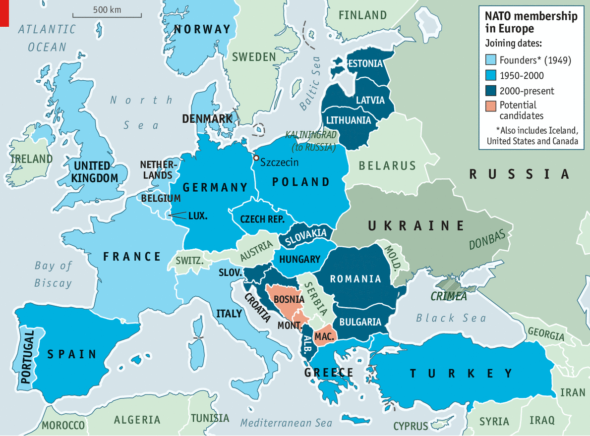
Map of NATO member states.
Russia has also rattled its neighbors by repeatedly testing their air defenses. NATO intercepted nuclear-capable Russian bombers and other warplanes in European airspace on more than 100 occasions last year, three times more than in 2013.
Even though a Ukraine ceasefire deal was hammered out this past week in Minsk by Paris, Berlin, Moscow and Kiev, the risk of the conflict heating up remains, Polish officials believe.
“The key to a political and military solution lies in Moscow,” Poland’s President Bronislaw Komorowski told reporters Thursday in Warsaw. “The possibility of a lasting peace still isn’t close,” he said, insisting that the previous Minsk accord failed due to the “Russian separatists in Donbas.”
Poland has earmarked 33.6 billion euros ($42 billion) on the upgrade over a decade, which includes a missile shield and anti-aircraft systems, armored personnel carriers and submarines as well as combat drones.
The plans bring Warsaw in line with NATO’s recommended defense spending level of 2.0 percent of gross domestic product. …..
TURKEY – Turkish parliament in second brawl this week over controversial anti-protest bill
Fisticuffs broke out in the Turkish parliament on Thursday night between members of the President Recep Tayyip Erdogan’s ruling AKP party and Kurdish opposition deputies. The altercation was over a bill they say will turn the country into an “authoritarian state.”
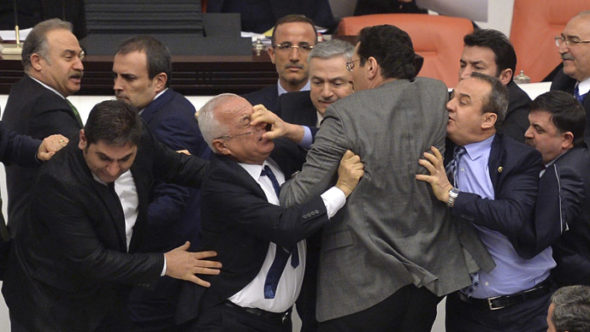
Lawmakers from the main opposition Republican People’s Party (CHP) and ruling AK Party (R) scuffle during a debate on a legislation to boost police powers, at the Turkish Parliament in Ankara late February 19, 2015.
The fight broke out after an increasingly fraught three-hour discussion of the mooted Homeland Security Reform, advocated by President Erdogan and his AKP party.
According to the local Hurriyet newspaper, tensions spilled over in Ankara when AKP’s deputy speaker Sadık Yakut began, seemingly on purpose, to mispronounce the name of Adil Zozani, a member of the Kurdish-dominated Peoples’ Democratic Party (HDP). Kurds say they will be the main casualties of the reform, which has been introduced ostensibly in response to violent pro-Kurdish protests last October.
In response, Zozani accused Yakut of being too “incapacitated” to perform his duties, setting off a mass slanging match, in which deputies alternately accused each other of “playing doctor” and being “mentally ill.”
One of the AKP deputies then bull-rushed a member of the CHP (Republican People’s Party), enraging the entire group, who threw punches, and tried to separate and protect their own party members. One CHP deputy was injured after falling down an internal staircase, but refused to leave the scene of the brawl to be attended to by a doctor, loudly vowing to “continue the fight.” The entire incident lasted around 10 minutes.
Unlike the previous scuffle between the same parties last Tuesday (Feb. 17), in which five people were injured after a ceremonial gavel and a chair were wielded as offensive weapons, no props came to hand in Thursday’s mass brawl.
The proposed legislation expands police powers, while reducing the need for judicial approval of a whole host of actions against protesters.
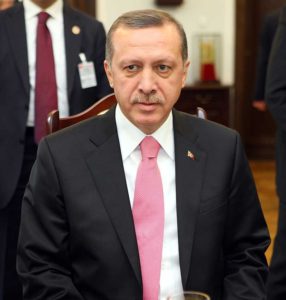
President Erdogan of Turkey.
If passed, potential dissenters could have their homes searched by the police without an order, and be detained for up to 48 hours without a court decision, at the behest of a regional governor. Opposition activists say this will allow the ruling politicians to sabotage any political protests by ordering arrests of key leaders.
During any actual demonstration, police would be entitled to fire live weapons against demonstrators, while anyone in the crowd wearing a mask, a common tactic to avoid criminal charges, could face up to four years in jail.
Critics of the regime say this is not just a means of cracking down on the restive Kurdish regions, but a means of stifling political dissent similar to the massive 2013 Gezi Park and Taksim Square protests.
The government-driven bill has been notably criticized by outside organizations, such as Reporters without Borders, who said that it would be used against independent journalists, and by former President Abdullah Gul, who said the measure would threaten “checks and balances” within the Turkish political system.
Although opposition parties have no means of challenging the AKP majority in parliament, they have promised to resort to filibusters to delay the passing of the reform.
ARGENTINA – More than 400,000 rally in Buenos Aires over prosecutor’s death
More than 400,000 people demanding justice marched in symbolic silence Wednesday in Buenos Aires to mark a month since the suspicious death of a prosecutor who was ready to accuse Argentine president Cristina Kirchner of a massive cover-up.
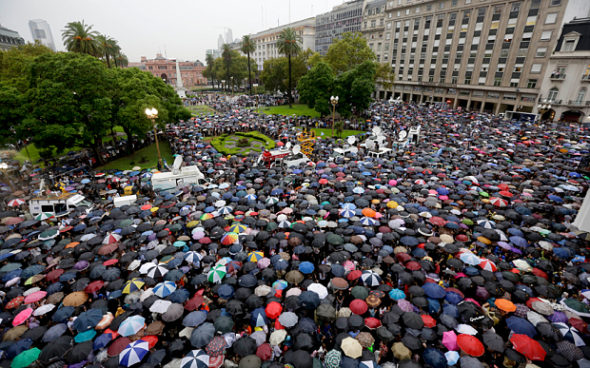
People gather in the iconic Plaza de Mayo to demand answers from the government in the mysterious death of prosecutor Alberto Nisman one month ago in Buenos Aires, Argentina
“I am here because I want to see justice done for someone who gave his life for the truth,” said teacher Marta Canepa, 65, among those walking the mile under the banner “Homage for Prosecutor Alberto Nisman.”
Drenched in driving rain and led by prosecutors and opposition figures, the rally is the first major public show of defiance in a murky case that has ignited a political firestorm in Argentina and piled the pressure on President Kirchner, 61, in her last year in office.
Among those who braved the deluge were Nisman’s two young daughters and his ex-wife, Judge Sandra Arroyo Delgado. …
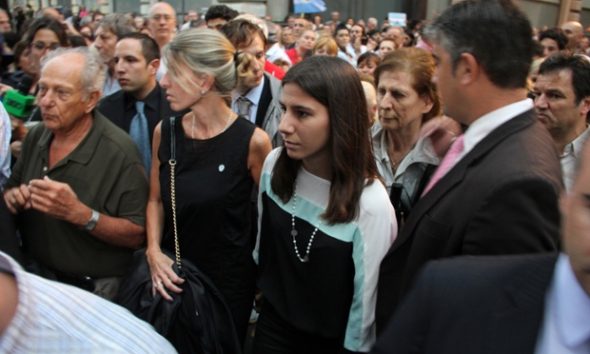
Alberto Nisman’s mother, Sara Ganfurkel (back) and former wife, Sandra Arroyo Salgado, with her two daughters Iara (pictured) and Kala, join a silent march to pay tribute to the late AMIA prosecutor
Nisman was found in his Buenos Aires apartment with a bullet through his head on January 18, the day before he was to go before a congressional hearing to air his finding that Kirchner and her foreign minister plotted to shield Iranian officials implicated in the bombing of the AMIA Jewish-Argentine charity federation.
Eighty-five people were killed and more than 300 injured in the attack, the deadliest in Argentina’s history – and one that has yet to be solved 21 years later. …..
Investigators initially said the death of the 51-year-old Nisman appeared to be suicide, but homicide has not been ruled out.
Nisman was found sprawled in his bathroom, with his back blocking the door and a .22-caliber pistol next to him. He was killed with a single shot to his temple.
In Argentina, the suicide theory is widely disbelieved – even by Kirchner, who has suggested that he was killed by former intelligence agents in an elaborate plot to smear her.
Nisman had accused Kirchner four days before his death of obstructing his investigation by cutting a secret deal with Iran in exchange for oil.
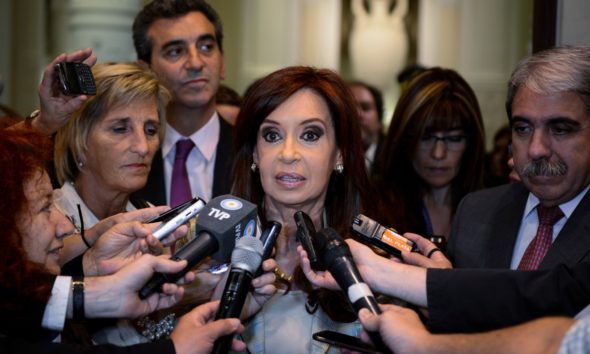
Argentine President Cristina Fernández de Kirchner talking to journalists at the presidential palace in Buenos Aires in December 2014.
In 2006, with the support of former president Nestor Kirchner, the current president’s late husband, Nisman charged that the bombing was carried out by Hezbollah with the involvement of top Iranian officials, including former president Akbar Hashemi Rafsanjani.
In 2013, Cristina Kirchner reached a deal with Iran that would have allowed Iranian suspects to be questioned at home, but that agreement never materialized.
Nisman and Argentina’s large Jewish community were vehemently opposed, arguing that Tehran could not be trusted.
In his accusation against Kirchner, which was reaffirmed on Friday by his replacement, Gerardo Pollicita, Nisman said the Argentine leader was working behind the scenes to protect the Iranians in return for oil, at a time when the South American country was in the midst of an energy crisis.
He also alleged that Kirchner asked Interpol to lift outstanding “red notices” against the Iranians – a request that Interpol’s former director denied had been made.
(The news briefs above are from wire reports and staff reports posted at YahooNews on Feb. 15, RussiaToday [RT .com] on Feb. 20 and London’s Daily Telegraph on Feb. 19.)
Background
POLAND - ON NATO:
- The North Atlantic Treaty Organization (NATO) is an alliance of 28 countries from North America and Europe committed to fulfilling the goals of the North Atlantic Treaty signed on April 4, 1949. …
- The fundamental role of NATO is to safeguard the freedom and security of its member countries by political and military means.
- Ukraine is not a member of NATO. Read about Ukraine-NATO relations at wikipedia.
From the NATO website nato.int:
The North Atlantic Treaty Organization (NATO) is an alliance of 28 countries from North America and Europe committed to fulfilling the goals of the North Atlantic Treaty signed on April 4, 1949. In accordance with the Treaty, the fundamental role of NATO is to safeguard the freedom and security of its member countries by political and military means. NATO is playing an increasingly important role in crisis management and peacekeeping.
POLITICAL – NATO promotes democratic values and encourages consultation and cooperation on defence and security issues to build trust and, in the long run, prevent conflict.
MILITARY – NATO is committed to the peaceful resolution of disputes. If diplomatic efforts fail, it has the military capacity needed to undertake crisis-management operations. These are carried out under Article 5 of the Washington Treaty – NATO’s founding treaty – or under a UN mandate, alone or in cooperation with other countries and international organizations.
For information on member countries, go to: nato.int/cps/en/natolive/nato_countries.htm
TURKEY:
- Read an additional news report on President Erdogan's controversial "Homeland Security Reform" bill: afp.com
- For a analysis of President Erdogan's leadership, go to Middle East Forum website: meforum.org
ARGENTINA:
- President Kirchner - Argentina's first democratically elected woman president and who is not seeking reelection - left the city with her cabinet ahead of the march, delivering a speech from the city of Zarate after inaugurating a nuclear power plant.
- Her government slammed the rally as "golpista" - seeking to destabilize the government.
- In a televised speech just hours before the march began, Kirchner also suggested that unnamed outside interests were somehow behind the scandal.
- Her top aides suggested that the United States and Israel were trying to drag Argentina into the Middle East conflict. (from the Telegraph article above)
On prosecutor Alberto Nisman's death and his investigation into the Iranian bombing of the Jewish center in Buenos Aires:
- The AMIA bombing was an attack on the Argentine Israelite Mutual Association building.
- It occurred in Buenos Aires on July 18, 1994, killing 85 people and injuring hundreds. It was Argentina's deadliest bombing ever.
- Argentina is home to a Jewish community of 200,000, the largest in Latin America and sixth in the world outside Israel.
- Over the years, the case has been marked by incompetence and accusations of cover-ups. All suspects in the "local connection" (among them, many members of the Buenos Aires Provincial Police) were found to be "not guilty" in September 2004.
- In August 2005, the federal judge in charge of the case was impeached and removed from his post on a charge of "serious" irregularities due to mishandling of the investigation.
- In October 2006, Argentine prosecutors Alberto Nisman and Marcelo Martínez Burgos formally accused the government of Iran of directing the bombing, and the Hezbollah militia of carrying it out.
- According to the prosecution's claims in 2006, Argentina had been targeted by Iran after Buenos Aires' decision to suspend a nuclear technology transfer contract to Tehran.
- In January 2015, the prosecutor in charge of the AMIA bombing investigation, Alberto Nisman, filed a 300-page complaint accusing President Cristina Fernández de Kirchner and and other pro-government political figures of "covering up" Iranian citizens allegedly involved in the 1994 attack.
- Nisman said his accusations were based on phone taps on close political allies of Fernández, who he said conspired in a "sophisticated criminal plan" to negotiate with Rabbani himself, one of the main suspects of perpetrating the deadly bombing.
- According to the accusation, Iranian oil would be exchanged for Argentinian grain, while Argentina would cancel an international Interpol arrest warrant against Rabbani and other senior Iranian officials.
- Nisman demanded a preventive embargo of 200 million pesos on Ferández de Kirchner and requested to question her, as well as [other lawmakers], the leader of the Iranian community in Argentina Jorge "Yussuf" Khali, and ex attorney and judge Héctor Yrimia.
- On January 18, 2015, Nisman was found dead at his home in Buenos Aires, hours before he was due to explain his allegations at the Argentine parliament.
- A gun and spent shell casing were found next to the body, and a government official said the death was likely a suicide although others considered the death suspicious.
- The judge Ariel Lijo returned immediately from his vacations to work in the case, and to order the protection of Nisman's proofs. Nisman was replaced by prosecutor Alberto Gentili.
- In the week following Nisman's death, and despite the fact that Nisman was going to implicate her among others had he lived, President Kirschner declared her determination to replace the Argentinian secret security service completely because it had been run beyond the state's control for too long. (from wikipedia)
